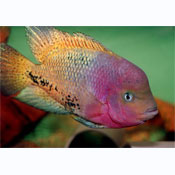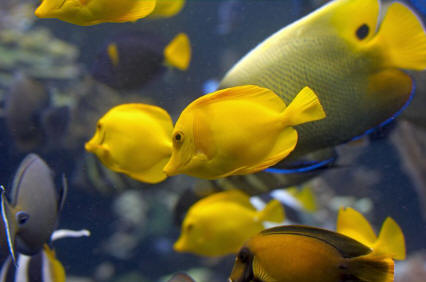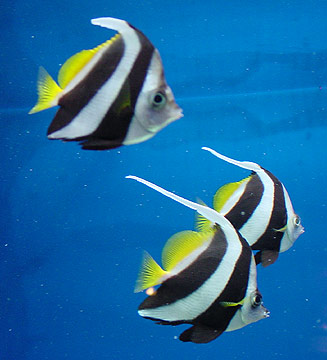Synspilum

|
Scientific Name: Vieja synspilum Price: Upon Request Origin: Guatemala, Belize Family: Cichlidae NOT AVAILABLE NOW |
|
Other Names: Synspilum Cichlid, Redhead Cichlid, Cychlasoma synspilum, Quetzal Cichlid, Firehead Cichlid, Herichthys synspilum, Vieja synspila |
|
Technical Info
Temperature: 24 - 26 ℃
pH: 6.8 - 7.2
GH: 1 - 5
Max size: 30 cm
Min Tank size: 500 Ltr
Position in Aqua: No special swimming level
Description
To other fishes they are rather peaceful but to fishes of their own kind they are very aggressive. A territory is made. The aquarium should be set up with driftwood, roots and stones because they need hiding places. In breeding time they dig a lot in the substrate and they eat plants, so plants can not be used.
Food
They are omnivorous so you should give them a great variety of live, frozen and dry food. A part of the food should be vegetable.
Breeding
Breeding only is possible with a good matching couple. The best way for a planned spawn is to raise a group of unrelated juveniles (6-8) to sexual maturity and allow them to pair off. The best pair should be chosen for breeding and other pairs should be removed. Up to 1000 eggs are laid and fertilized on a substrate. After 3-4 days the eggs hatch and another 3 days later the young fishes are swimming free. Both parents care for the fry very intensive. You can raise the young fishes with baby brine shrimp and fine crushed dry food.
Compatible with
A moderately aggressive species. It may be possible to successfully keep this species in a community of robust Central American cichlids, if enough rock and bogwood is provided to form sufficient territories for all the fish. There is no guarantee of success if trying this. A bonded pair will often live quite happily together but care should be taken to ensure the female is not bullied.
Note
Adult males are brighter than females and tend to develop a slight nuchal hump. Males also have more flowing finage than females.

